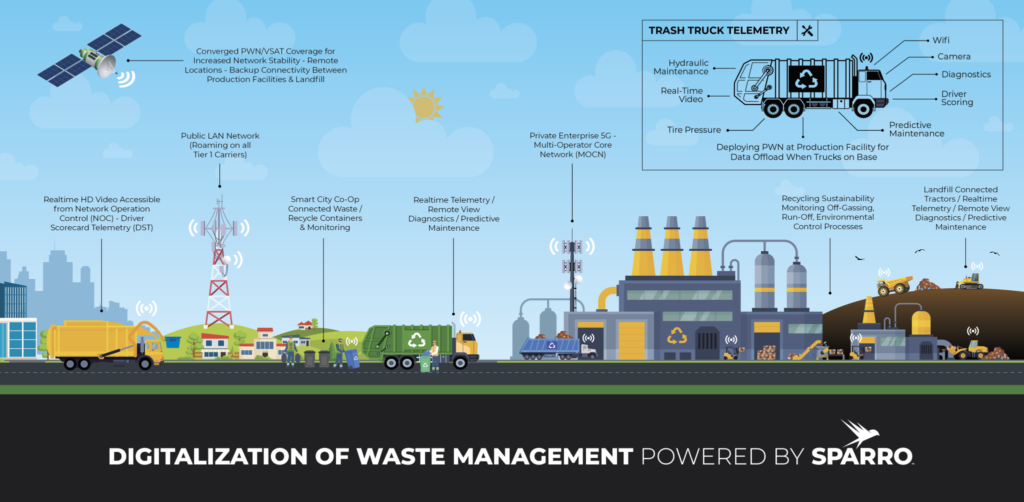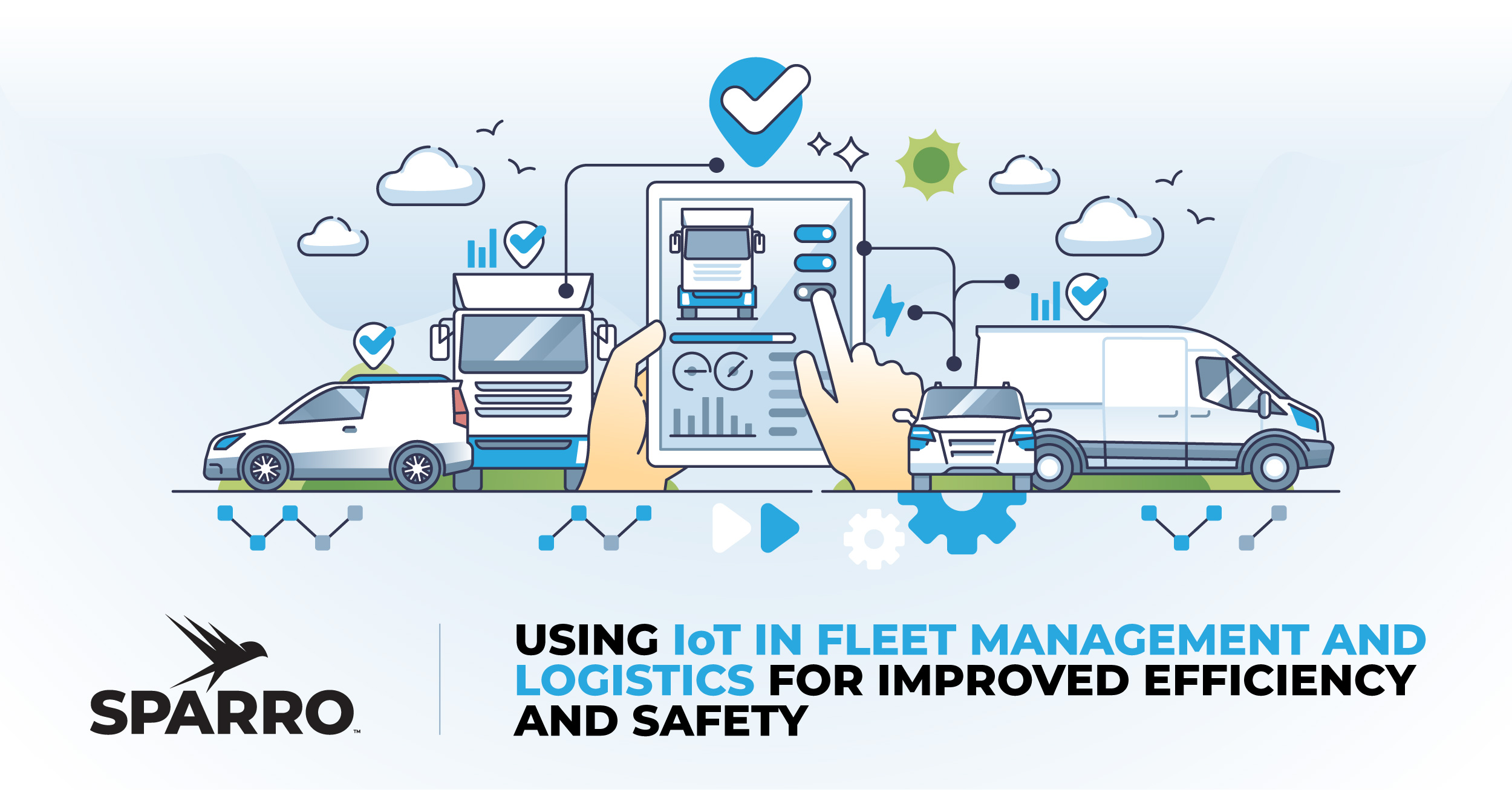Table of Contents
- Optimizing Fleet Management
- Enhancing Logistics
- Improving Safety and Security
- Promoting Sustainability
- Future Trends
- Preparing for IoT
As the world becomes increasingly connected, businesses are using innovative technologies to remain competitive. One such innovation is the Internet of Things (IoT), a network of connected devices that collect and exchange data and perform tasks based on that data. These devices may include sensors, actuators, GPS trackers, RFID tags, and cameras that can provide real-time insights and facilitate automation. An example of successful implementation is IoT in fleet management and logistics.
Leading companies have already seen the benefits of IoT in their operations. For example, DHL has implemented IoT to gain real-time fleet tracking, temperature and cargo monitoring, diagnostic data, and automated maintenance workflows. Maersk uses IoT with GPS-based sensors and RFID tags to track and monitor shipping containers. Not only does this provide real-time insight into their cargo, but it also enables them to use automated cranes for optimal container placement throughout the shipping process.
By integrating IoT technology into their business operations, fleet management and logistics companies can optimize operations, enhance safety, and promote sustainability. These benefits are leading more companies to implement IoT to gain a competitive edge. The growth potential is significant, with analysts estimating the value of the IoT fleet management market in 2023 at $8.5 billion and a projected CAGR of over 11% from 2024 to 2032.
Let’s examine in more detail some of the benefits businesses can gain by implementing IoT.
Optimizing Fleet Management
Real-Time Tracking and Route Optimization
One of the primary benefits of IoT in fleet management is real-time tracking. GPS-enabled devices allow managers to monitor vehicle locations, speeds, and routes. They can then use this data to optimize routes, reducing fuel consumption and delivery times. With additional information about traffic patterns and road conditions, IoT solutions can suggest alternate routes, helping drivers avoid delays and save costs.
Predictive Maintenance
IoT sensors can monitor the health of fleet vehicles by tracking engine performance, tire pressure, and other critical metrics. This data enables managers to address potential issues before they become significant problems. By preventing breakdowns and extending the lifespan of vehicles, companies can reduce downtime and maintenance costs.
Fuel Management
Fuel is one of the most significant expenses in fleet operations. IoT devices can monitor fuel consumption and driving behaviors, such as idling and hard braking, that impact fuel efficiency. Managers can use this information to implement fuel-saving practices and driver training programs. This ultimately reduces costs and lessens environmental impact.

Enhancing Logistics
Real-Time Telemetry
Real-time telemetry has the potential to make a real impact on logistics. IoT devices can provide continuous data on vehicle performance, driver behavior, and environmental conditions. This data allows for immediate adjustments, ensuring operations run smoothly and efficiently. Whether by rerouting vehicles to avoid traffic or suggesting adjustments to driving habits to conserve fuel, real-time telemetry keeps the fleet performing at its best.
Remote View Diagnostics
Remote view diagnostics offers another significant advantage of IoT in logistics. Using IoT, technicians can access vehicle data remotely, diagnosing issues without needing to be there with the vehicle. This ensures that mechanics can identify any potential problems and resolve them quickly. Remote view diagnostics can reduce downtime and speed up maintenance, keeping the fleet operational and minimizing disruptions.
Inventory and Asset Tracking
IoT technology enhances inventory management by providing real-time tracking of goods and assets. RFID tags and sensors can monitor the location and condition of products throughout the supply chain. This visibility supports more accurate inventory levels, reduces the risk of theft and loss, and improves order fulfillment.
Cold Chain Management
IoT plays a critical role in industries that require temperature-sensitive logistics, such as food and pharmaceuticals. Sensors and actuators can monitor and control the temperature and humidity of shipments, ensuring that products remain within the required conditions. The system can send alerts if there are deviations, allowing immediate corrective action to prevent spoilage or damage.
Improving Safety and Security
Driver Safety
IoT technology can improve driver safety by monitoring driving behaviors and providing feedback. Dashcams and sensors can detect hard braking, speeding, and other unsafe practices. Managers can use this data to provide targeted training and incentives for safe driving. Real-time alerts can also notify drivers of potential hazards, such as adverse weather conditions or accidents, helping them make more informed decisions.
Theft Prevention
Security is a significant concern in fleet management and logistics. IoT devices can provide real-time surveillance and tracking, helping to prevent theft and unauthorized access. GPS trackers can pinpoint the location of stolen vehicles or goods, facilitating quick recovery. Geofencing technology can also create virtual boundaries and send alerts if vehicles or assets move outside designated areas, lessening the likelihood of losses.
Incident Response
In the event of an accident or security breach, IoT solutions can provide valuable data for incident response. Cameras and sensors can record the event, providing evidence for investigations and insurance claims. Management and investigators can access this data remotely with connected systems for faster resolution. Automated alerts can also notify emergency services when needed, ensuring a swift response with potentially better outcomes for drivers.
Promoting Sustainability
IoT technology plays a crucial role in promoting sustainability in fleet management and logistics. With data to support more efficient route planning and improved fuel management, companies can reduce their carbon footprint. IoT sensors can also monitor emissions and vehicle efficiency, providing real-time data to help companies meet their environmental goals.
Future Trends
While more companies are using IoT for real-time tracking, diagnostics, and safety, some emerging trends promise additional benefits.
For example, autonomous vehicles are poised to revolutionize logistics. These vehicles can use IoT and AI technologies to predict road and weather conditions, select optimal routes, and reduce human error. There are certainly technical challenges to widespread implementation, but several companies are working on autonomous trucks that can enhance delivery predictability and efficiency.
Drones have emerged as a solution for last-mile deliveries, particularly in urban areas and in-house deliveries in large facilities. They can reduce costs while increasing delivery speed and improving customer satisfaction. Current drone technology has limited range and capacity, but companies like Amazon, FedEx, and UPS are developing and testing improved systems.
Combining IoT with AI can also significantly enhance predictive analytics capabilities for fleet management and logistics. AI algorithms can analyze vast amounts of data from IoT sensors to predict maintenance needs, optimize routes, and improve fuel efficiency. This proactive approach can help prevent breakdowns, reduce downtime, and ensure more reliable operations. AI-driven insights can also identify patterns and trends that might not be evident through conventional analysis.
Preparing for IoT
To prepare for increased implementation of IoT technology, companies must focus on connectivity and data security. Reliable connectivity is essential for real-time data transmission between IoT devices and central management systems. Real-time tracking, predictive maintenance, remote diagnostics, and similar benefits of IoT require seamless, reliable communication. To address this, companies are investing in solutions like private 5G and fiber with provisions for redundancy and failover.
Data security is also crucial for IoT implementation. The vast amounts of data generated by IoT devices include sensitive information such as vehicle locations, driver behavior, and cargo details. Protecting this data from breaches and cyberattacks is essential to maintaining operational integrity and customer trust. Implementing robust security measures such as end-to-end encryption, secure authentication, and regular security audits can help safeguard this data. Adaptive network security takes a proactive approach, continuously monitoring and adjusting security measures based on real-time threat intelligence and network activity. Such measures not only enhance safety and security but also build confidence among customers and other stakeholders.
The integration of IoT in fleet management and logistics offers benefits that can help businesses optimize their operations, reduce costs, enhance safety and security, and improve sustainability. With real-time data and automation, companies can achieve greater efficiency, protect their assets, and ensure the well-being of their drivers. These benefits make IoT an essential technology for businesses looking to stay ahead in a competitive market.
SPARRO orchestrates the digital transformation of large enterprise customers through wired and wireless networking, edge computing, IT agility, connected security, and 5G solutions. We are your trusted technology partner for better fleet management and logistics. We design your custom solution for easy installation, maintenance, monitoring, and management of our services, simplifying the path to deployment and use.

